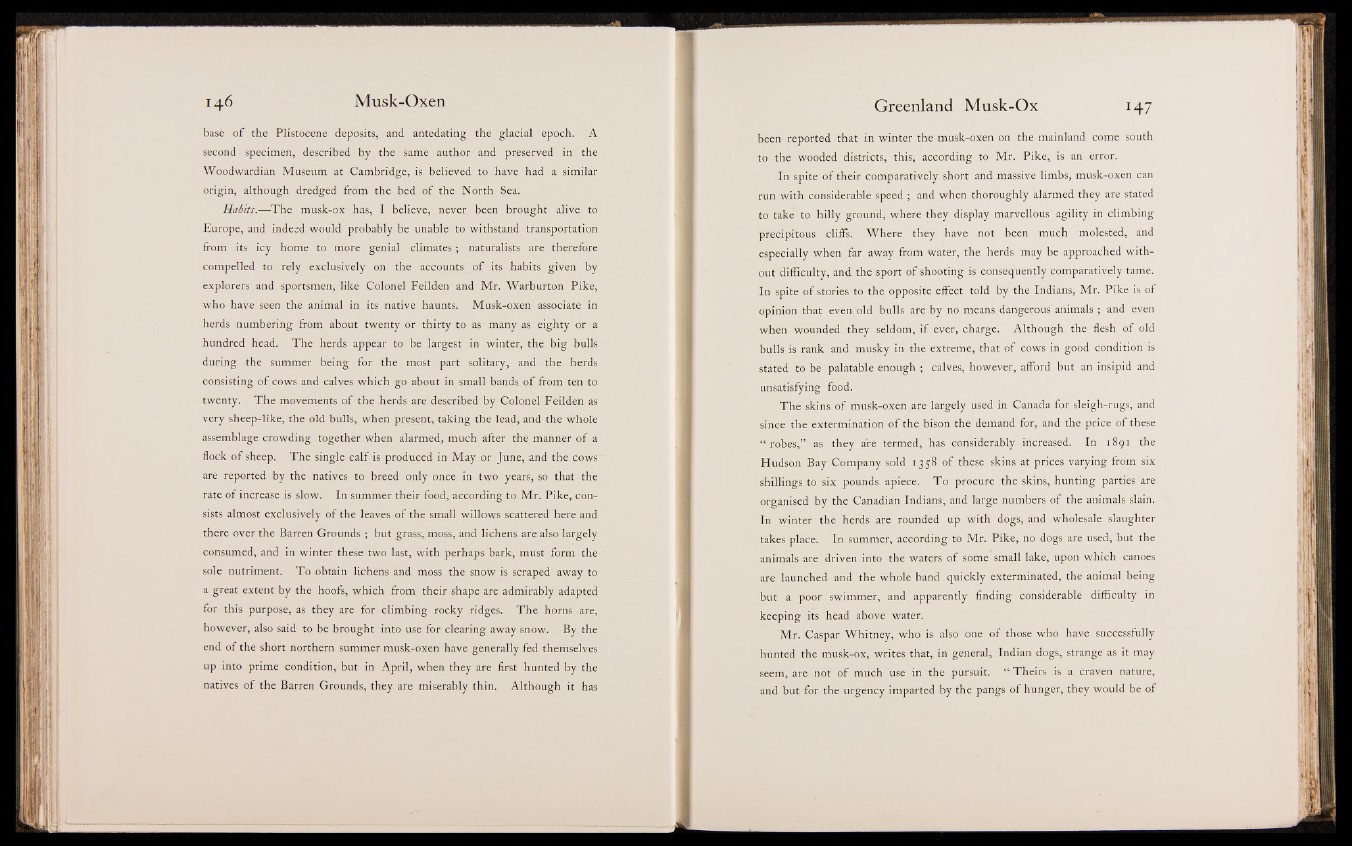
146 Musk-Oxen
basé of the Plistocene deposits, and antedating the glacial epoch. A
second specimen, described by the same author and preserved in the
Woodwardian Museum at Cambridge, is believed to have had a similar
origin, although dredged from the bed of the North Sea.
Habits.—The musk-ox has, I believe, never been brought alive to
Europe, and indeed would probably be unable to withstand transportation
from its icy home to more genial climates ; naturalists are therefore
compelled to rely exclusively on the accounts of its habits given by
explorers and sportsmen, like Colonel Feilden and Mr. Warburton Pike,
who have seen the animal in its native haunts. Musk-oxen associate in
herds numbering from about twenty or thirty to as many as eighty or a
hundred head. The herds appear to be largest in winter, the big bulls
during the summer being for the most part solitary, and the herds
consisting of cows and calves which go about in small bandsjaf from ten to
twenty. The movements of the herds are described by Colonel Feilden as
very sheep-like, the old bulls, when present, taking the lead, and the whole
assemblage crowding together when alarmed, much after the manner of a
flock of sheep. The single calf is produced in May or June, and the cows'
are reported by the nativès to breed only once in two years, so that - the
rate of increase iaislow. In summer their food, according to Mr. Pike, consists
almost exclusively of the leaves .of the small willows scattered here and
there over the Barren Grounds ; but grass, moss, and lichens.are also largely
consumed, and in winter these two last, with perhaps bark, must form the
sole nutriment. To obtain lichens and moss the snow is scraped away to
a great extent by the hoofs, which from their shape are admirably adapted
for this purpose, as they are for climbing rocky ridges. The horns are,
however, also said to be brought into use for clearing away snow. By the
end of the short northern summer musk-oxen have generally fed themselves
up into prime condition, but in April, when they are first hunted by the
natives of the Barren Grounds, they are miserably thin. Although it has
Greenland Musk-Ox 147
been reported that in winter the musk-oxen on the mainland come south
to the wooded districts, this, according t® Mr. Pike, is an error.
In spite of their comparatively short and massive limbs, musk-oxen can
run with considerable speed ; and when thoroughly alarmed they are stated
to take to hilly ground, where they display marvellous agility in climbing
precipitous cliffs. Where they have not been much molested, and
especially when far away from water, the herds may be approached without
difficulty, and the sport of shooting is consequently comparatively tame.
In spite of stories to the opposite effect told by the Indians, Mr. Pike is of
opinion that even old bulls are by no means dangerous animals ; and even
when wounded they- seldom, i f ever, charge. Although the flesh of old
bulls is rank and musky in the extreme, that of cows in good condition is
stated to be palatable enough ; calves, however, afford but an insipid and
unsatisfying food.
The skins of musk-oxen are largely used in Canada for sleigh-rugs, and
since the extermination of the bison the demand for, and the price of these
“ robesJS as they are termed, has considerably increased. In 1891 the
Hudson Bay Company sold 1358 of these skins at prices varying from six
shillings to six pounds apiece. To procure the skins, hunting parties are
organised by the Canadian Indians, and large numbers of the animals slain.
In winter the herds are founded up with dogs, and wholesale slaughter
takes place. In summer, according to Mr. Pike, no dogs are used,'but the
animals are driven into the waters of some small lake, upon which canoes
are launched and the whole band quickly exterminated, the animal being
but a poor swimmer, and apparently finding considerable difficulty in
keeping its head above water.
Mr. Caspar Whitney, who is also one of those who have successfully
hunted the musk-ox, writes that, in general, Indian dogs, strange as it may
seem, are not' o f much use in the pursuit. “ Theirs is a craven nature,
and but for the urgency imparted by the pangs of hunger, they would be of